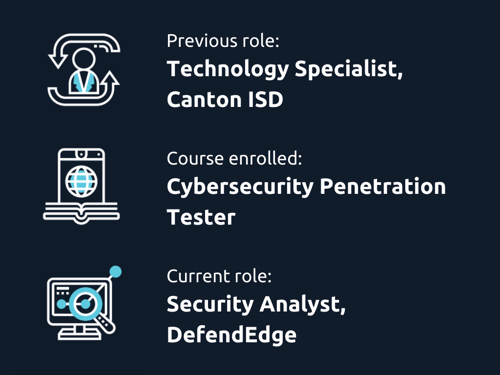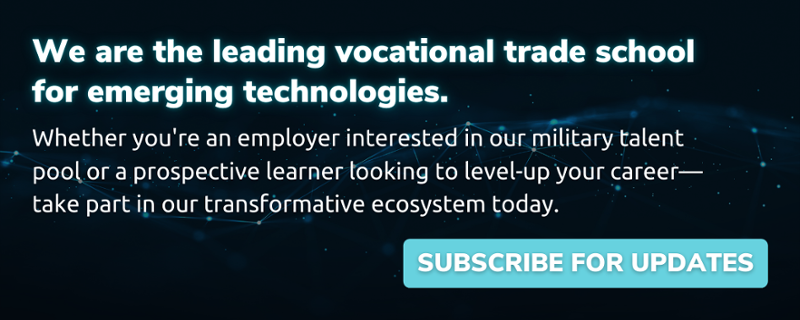Divergence Blog
Latest
- Red vs Blue: Decoding Cybersecurity Team Roles
- From Teacher to Tech Pro: Your Guide to a Rewarding Career Transition
- Navigating the VET TEC Pause: Choosing the Right Path for Tech Education.
- The Future of Work in the Age of Quantum Computing and AI
- What is Capture the Flag?
- KQL vs SQL
- How to Advance Your Career with Advanced Postgres
- Alumni Series: How Michael Williams Became a Cybersecurity Pentester
- A Veteran Success Story with Antonio Grant
- Leveraging a Cybersecurity Bootcamp to Launch a Career in Tech
A Veteran Success Story with Anthony Hunter
Learning how to be a part of the civilian workforce is an interesting experience.
The military plays a big part in my background. I joined the Air Force two weeks after I graduated from high school and made the decision to come in for open general. For veterans who are reading this, you understand what I mean. For those who don’t, open general just means that you get assigned where you’re needed the most.
I was lucky. I got the job that I was applying for and became a police officer. I then spent the next 24 years inside the military, traveling around the world and doing different things for police work. I learned quite a bit, and now, I’m learning how to be a civilian. It’s an interesting experience; one that Divergence has actually been very helpful with.

When I retired about four years ago and moved to East Texas, it was to try and figure out what I wanted to do with my life. Growing up, I've always loved computers. When I started looking at job applications, I wanted to see what was out there, what pays well, and also what would interest me in terms of work.
That’s how I found out that cybersecurity and information security are really translatable given my experience as a service member. Integrated defense, defense in depth - these are concepts that translate because you’re protecting networks and organizations, and it’s all very similar to what I was taught in the Air Force.
Understanding the concepts was a smooth transition overall. It helped that I had gone back to school and graduated with a bachelor's degree in Cyber. I was the first in my family to actually go to college and graduate - which is a pretty big deal.
Luckily, within a few months of graduating, I obtained a position working as a Technology Specialist at Canton Independent School District in East Texas. It was a great starting point, but a year after that, I realized that working in Support wasn’t exactly what I wanted to do.
VET TEC and Pursuing Cybersecurity as a Career
I'd built up enough knowledge and experience with both my degree and that one year as an IT specialist to get my foot in the door. But I also knew I would need more training so I started doing research.
Admittedly, I’d never heard of VEC TEC. While I was fairly active in looking up the different federal programs to help fund my training, I learned about VET TEC from someone in one of my IT groups. They explained what the program was and directed me to the VA website, which is how I found Divergence Academy under the VA’s preferred category.
What that means is, that if the organization (in this case, Divergence) doesn’t get you a job within six months, the organization doesn’t get paid. That means that if they don't get you a job, within six months, the organization divergence in this case doesn't get paid. I think it’s phenomenal that there’s a kind of support system [of accountability in place for these organizations with the VA-preferred status].
For veterans reading this, I highly suggest that you use your VET TEC benefits before considering the GI Bill. Using VET TEC doesn’t impact your GI Bill benefits. And that only means you can get more money for training later on.
Transitioning to Online Classrooms amid the Global Pandemic
I signed up for the 10 week course in March right after COVID decided to rear its ugly head. My cohort was one of the first classes to migrate online - considering that Divergence was able to scramble that within a couple weeks’ time frame was phenomenal.
I’m personally more of an “in-person learning” person. So, taking learning into a completely online environment - where your only interaction is with people through a camera and computer - is challenging. It helped that everyone in my group were veterans and we just adapted to make it happen. We set up individual study groups, so that made learning a little easier as well.
I appreciated how the instructors were on-point about breaking at the hour, because in those first two weeks it’s like drinking straight from a fire hose. Divergence calls it a boot camp for a reason. So, for those interested in joining the programs, you’ve got to make sure you're ready for it when it hits.
The instructors were outstanding. They knew exactly what they were talking about and you could tell they had the history and the industry experience behind them. I was also impressed by how they were able to talk at a level where those in the class without IT experience could keep up, while making sure that we got all the course information.
Pre-enrollment Support and Self-driven Learning
Divergence’s pre-enrollment team also provides great support to mentally prepare you for the bootcamp. They send you a link to preparatory resources such as Cyber Wookie and also provide recommendations to other sources. In my case, I was directed to the FedVTE - Federal Virtual Training Environment - which is free for veterans and government employees. You get the training you need all on video.
I was advised to ‘go knock out the A+ information, start studying the Net+ information, then get to the Security+ information’ and I was glad for that guidance. I got halfway through Net+ before the course started and being given these resources so I could prepare helped a lot. If you’re someone who doesn’t have the IT experience, you really need to get into the books - these resources - so you feel empowered to keep up.
I credit, honestly, Divergence, for getting me hired.
About halfway through the course, in the sixth or seventh week, I started hammering LinkedIn and some of the other job hunting sites to farm out my resume.
I put Divergence down and I pulled information from the courses we were going through. I made it clear that I was still a student under Divergence. When I finally sat down for the interview, they asked me what I was doing at Divergence. So I took the opportunity to share my experience in those classes and talk about the kind of learning I was getting.
Suffice to say, they were very impressed with the type of training that I was receiving. Therefore, why I credit Divergence as the reason they hired me.
*As of June 2020, Anthony is a Security Analyst at DefendEdge.
